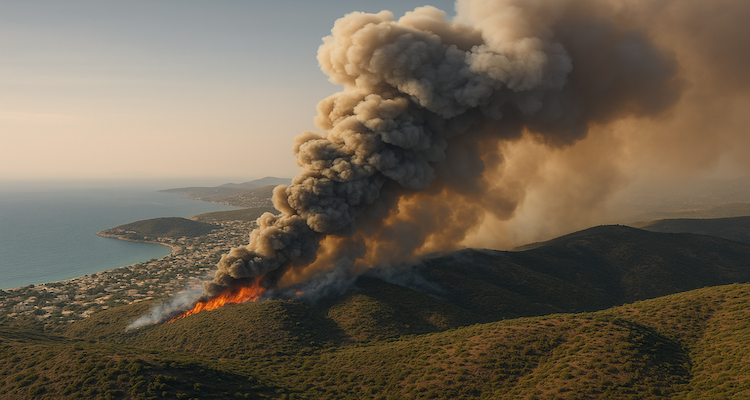Wildfire Crisis Near Athens Forces Evacuations as Greece Battles Climate Extremes
Wildfires south of Athens torch homes near Palaia Fokaia, triggering evacuations amid sweltering heat and fierce winds. Greece braces for more fire risks.
Introduction: Summer Flames Return to Greece’s Southern Coast
A raging wildfire erupted Thursday near the coastal town of Palaia Fokaia, about 40 kilometers (25 miles) south of Athens, engulfing homes and summer properties in its path. Fanned by strong winds and fueled by scorching temperatures, the blaze forced dozens of residents to flee, as emergency crews scrambled to gain control.
Context & Background: Greece’s Climate Battlefront
Greece, located on Europe’s southern edge, has become increasingly vulnerable to extreme weather events, with wildfires and floods intensifying in frequency and scale. Scientists point to climate change as a critical driver behind the rise in summer wildfires, which now ignite earlier and burn longer.
This week alone has seen multiple blazes across the country, a grim signal of another potentially devastating wildfire season. Greek authorities have already spent hundreds of millions of euros in recent years on disaster relief and infrastructure, acknowledging the mounting cost of a warming planet.
Main Developments: Homes Burned, Dozens Flee, Fire Crews Mobilized
By Thursday afternoon, more than 130 firefighters were battling the flames in the Palaia Fokaia area, supported by 12 water-dropping aircraft and 12 helicopters. Dense gray smoke could be seen billowing over pine-covered hills as temperatures soared to 38°C (100°F), creating tinderbox conditions.
Firefighters were seen battling flames dangerously close to residences, with a protective cordon placed along the seaside highway to prevent further risk to human life. Emergency services worked swiftly to evacuate 40 residents, while the coastguard positioned vessels nearby for potential sea evacuations should conditions worsen.
“Firefighters are making a valiant effort against overwhelming odds, especially near homes,” fire brigade spokesperson Vasilios Vathrakogiannis told reporters during a live televised update.
Expert Insight: Preparedness Faces the Heat Test
Authorities had already raised Greece’s wildfire alert level earlier in the week, anticipating the fire risk would peak Thursday and Friday before easing slightly with forecasted cooler weather.
“We’re witnessing longer fire seasons, with more frequent and intense outbreaks,” said a senior environmental analyst based in Athens. “Investments in equipment and personnel are critical, but without climate adaptation and land management reforms, the system remains reactive rather than resilient.”
In anticipation of another punishing summer, Greece boosted its firefighting force to a record 18,000 personnel this year and upgraded its aerial fleet to handle larger-scale incidents.
️ Impact & Implications: A Season of Peril Begins
The latest blaze underscores the growing toll climate-fueled disasters are taking on southern Europe. While Greece’s readiness has improved—with better-trained crews, more aircraft, and faster evacuation protocols—the sheer force of the elements is testing the limits of that preparation.
With tourist season peaking and many coastal towns filling with visitors, the risks extend beyond physical destruction. Disruptions to travel, health hazards from smoke inhalation, and stress on local economies are all potential ripple effects of this wildfire wave.
Looking ahead, authorities have warned that the risk of further wildfires remains high across central and southern Greece, urging residents and visitors alike to remain alert and follow evacuation orders promptly.
Conclusion: Bracing for What Comes Next
As Greece enters the height of its fire season, Thursday’s wildfire near Palaia Fokaia serves as a stark reminder of the volatile summer ahead. The blend of extreme heat, dry vegetation, and fierce winds forms a dangerous recipe—one that communities, emergency responders, and policymakers must grapple with in real-time.
While crews managed to contain parts of the blaze by nightfall, the underlying threat remains. The nation’s resilience will continue to be tested as climate change tightens its grip on the Mediterranean.
Source: (Reuters)











